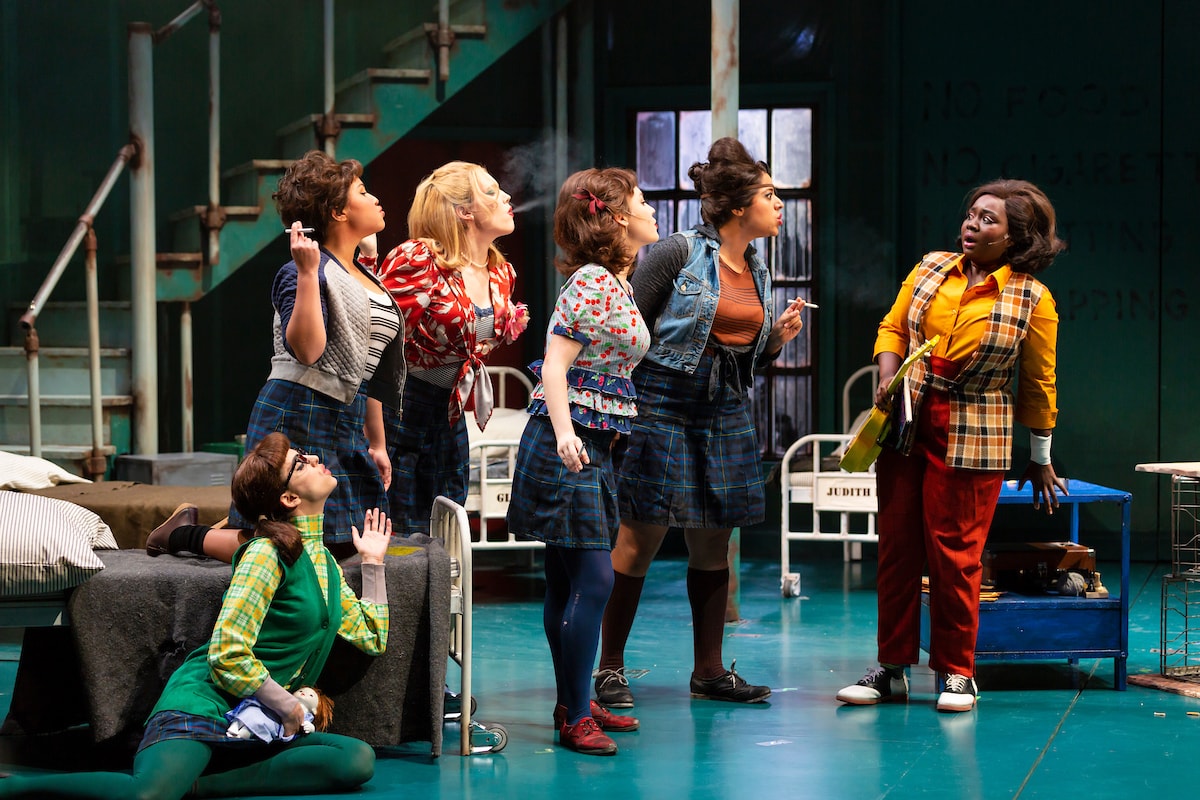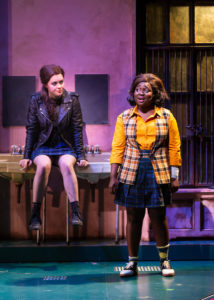Love in Hate Nation is the new musical from Be More Chill’s composer/lyricist, Joe Iconis. Animated with a driving wheel of rock and funk rock tunes, it grapples with the pressing cultural issues of the early 1960’s and beyond.

For Love in Hate Nation, Iconis not only is composer and lyricist, but also the book writer. He composed 18 vivid original works that include a number of solo “who I am” character depicting songs and several verve-filled, purposefully unruly production numbers. Love in Hate Nation recently had its professional stage premiere at Two River Theater, Red Bank, NJ. Two River Theater is the same venue that commissioned and premiered the Tony Award nominated Be More Chill.
Love in Hate Nation is neither prequel nor sequel to Be More Chill. In program notes, Iconis described Love in Hate Nation as an idea that came together so that “this show is really about a 16-year-old queer woman of color in the 1960’s.” He also noted that “in musical theater specifically, I feel that women almost always get the short end of the stick insofar as having good stuff to do.” The production was directed with zing by John Simpkins.
Love in Hate Nation takes place in 1962. The location is a juvie (juvenile) hall called the National Reformatory for Girls and dubbed “Nation.” It is a place where system-defined “rebellious” teenage girls are housed. Living in isolation from the mainstream world, a small group of girls is to be made more obedient. They are supervised by a controlling, mean-spirited, hate-filled woman named Miss Asp (suitably portrayed by Lauren Marcus in a Nurse Ratched-style mode). She is a woman with her own deep secrets that affect her attitudes and behavior to the teens. The facility is also home to Dr. Shock (Ryan Vona). He believes that electroshock therapy (EST) is a fitting, healing medical tool for those the system defines as deviant.
But Love in Hate Nation is way more. It is also a slowly evolving love story between two of the young women housed in the Nation. The two are Susannah Song (a polite, scared Amina Faye with an angelic plaintive voice and authentic line delivery) and Sheila Nail (a tenacious, very honorable Kelly McIntyre with a non-conformist edge to her character portrayal).

Susannah is at the Nation since her parents find her behavior challenging. She is the Black child of white adoptive parents. Susannah is infatuated with privileged white college student (Ryan Vona as Francis) who wants to seem cool to his new social activist friends by dating a person of color.
Over time as Susannah remains at the juvenile facility, she becomes dazed with Francis’s shallowness. She is self-aware: “I’m too Black to be indifferent.” Trying to find her authentic self and reduce her confusion with her interest in Sheila, Susannah sings lamenting lyrics from the song “I Hope”: “I’m in a trap/I need a map/Will someone throw me a rope/I hope/ ‘Cause I’m tired of waiting/And deliberating/I just want to know/Which way my life will go.”
As for Sheila, her interest in Susannah brings out the reason why she has been housed in the juvie hall. On the outside before even knowing Susannah, Sheila has attempted to harm herself through unsuccessful suicide attempts. Dr. Shock finds Sheila someone to experiment with EST as she tries to run away from the Nation.
Added to the featured performances are four other characters who add layers upon layers of complicated intersections of conformity, sexism, racism, class issues, sexual orientation, and gender identity or expression. The talented, enlivened cast includes Sydney Farley as Ya Ya; Jasmine Forsberg as Rat; and Emerson Mae Smith as Kitty; and Tatiana Wechsler as Judith. Each character has an idiosyncratic nature and reason for being locked up against their will.
As Love in Hate Nation moved through to final scenes (Iconis calls them “chapters”) the music and choreography rose to an infectious “rush.” Hats off to the smoking seven-member band conducted by Annastasia Victory. (She was also the vocal arranger). Dancing numbers for “Masochist” and “Revolution Song” were abundantly energized with choreography by Mayte Natalio.
The production’s scenic design by Meredith Ries is a two-level affair with plenty of steps and visual details that add pop to the production with the lighting by Isabella Bryd. Costumes by Karen Perry, along with hair and wigs by J. Jared Janas provide each character their own visual statement.
With so many characters and issues represented, Love in Hate Nation might benefit from a tighter focus to concentrate on deeper insights. The character of Kitty as portrayed by Emerson Mae Smith could be built up. A coda-like epilogue that takes place in the early 1980s provides important clues about what happens to the characters, but it has a quick “tacked-on” mood to it. There could also be a better balance between the musical as impressionistic entertainment and its touching cultural messages and history lesson.
Any shortcomings aside, Love in Hate Nation is likely to be seen on other stages. Let’s end with the lyrics from “Revolution Song,” which was belted out and athletically danced by the aggrieved young women.
“I’m supposed to act the way they want me to act/But I don’t wanna act that way, so/ Revolution in the institution/ Won’t be told whose hand I can hold/Or which words I’m allowed to say, no/ Revolution in the institution.”
Running time: Two hours and 30 minutes with one intermission
Love in Hate Nation played through December 1, 2019, at Two River Theater – 21 Bridge Ave, Red Bank, NJ. For more information about Two River Theater, visit them online.
Songs
“Suzannah’s Song”
“Life in Hate Nation”
“The Three Failed Escape Attempts of Sheila Nail”
“Doc Shock Theme Song”
“Montage: ‘This is the Way…”
“Miss Asp’s Song”
“The Other One”
“Francis’s Song”
“Jezebel”
“Oh, Well”
“I, Hope”
“Solitary”
“Masochist”
“Miss Asp’s Song II”
“Revolution Song”
“Operations Sha La La”
“I was a Teenage Delinquent”
“Finale”
Musicians
Conductor and Keyboard 1: Annastasia Victory
Drums Rose Avjla
Gutasr: Dave Cinquegrana
Reeds: Tessa Dolce
Trumpet/Flugabone/Harmonica: Nick Frenay
Keyboard 2: Geoffrey Ko
Bass: Chris Lough




